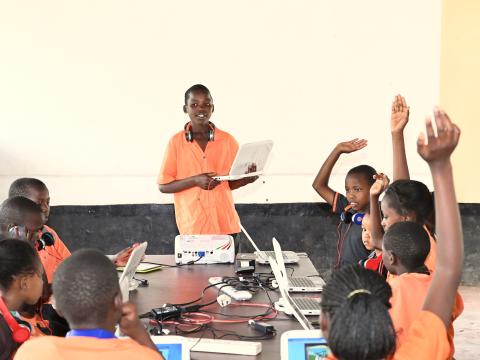Digital learning child advocate supports pupils to access quality education

By Sarah Ooko, World Vision Senior Communications & Media Specialist, Kenya
Aron, 15, loves computers and is a digital technology advocate in his community in Kirindon, situated in Narok County, Kenya.
The boy was introduced to the digital world three years ago (2019), when World Vision distributed computer laptops and tablets to his school, among other learning institutions in the area. The aim of this initiative was to improve the quality of education being offered to children in rural schools through e-learning.

Due to high poverty levels among rural communities in Kenya, most parents cannot afford sufficient text books and other learning materials for their children.
The schools in these areas also lack enough teachers to pay adequate attention to the needs of all pupils. These challenges contribute to the poor education performance of children from rural schools in Kenya.

The computers distributed by World Vision to these schools contain a wide variety of electronic text books for various subjects as well as story books that have made learning materials to be accessible to all children.
Aside from that, the computers have several special learning software that offer learning tutorials to pupils on how to read, calculate sums and pronounce words correctly.

When the e-learning lessons were introduced at Aron's school, he was quick to grasp the concepts and begin interacting comfortably with the gadgets as well as the learning material in them.
Due to his expertise in navigating these digital technologies as well as his excellent performance in class, Aron was appointed by his teachers as one of the child digital champions in his school.

"I was happy and humbled by this appointment. This gave me the opportunity to share the knowledge I had acquired with other children in my class, school and the community. In Sunday school, I learnt that God wants us to be kind and not selfish with what we have. So, I am happy to share my digital skills with others," he says.
Since computer lessons take place only a few days in weeks, Aron usually avails himself to tutor or assist pupils struggling to grasp e-learning techniques during class breaks or when lessons are over in the evenings.

"This has helped many of the children to learn how to use the computers so they can access books and the learning tutorials. They are also able to use the internet which has opened their eyes to the world," he says.
Aron believes that the work he is doing will help bridge the digital gap between children from rural communities and those from urban areas.

“This will go a long way in ensuring that children from poor families are able to access quality education and perform well in school through e-learning,” he says.
According to Aron, his journey as an e-learning advocate is fulfilling.
“I have learnt that the more you help others, the more you also grow. My digital technology skills and knowledge keep on improving the more I share them with others.”